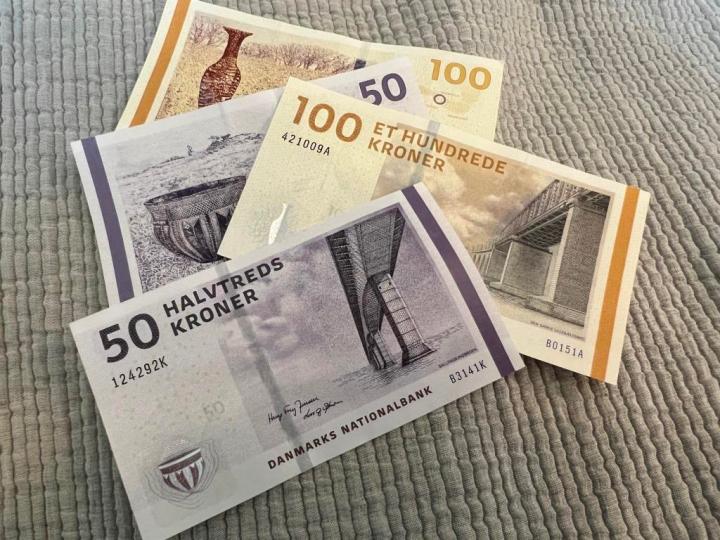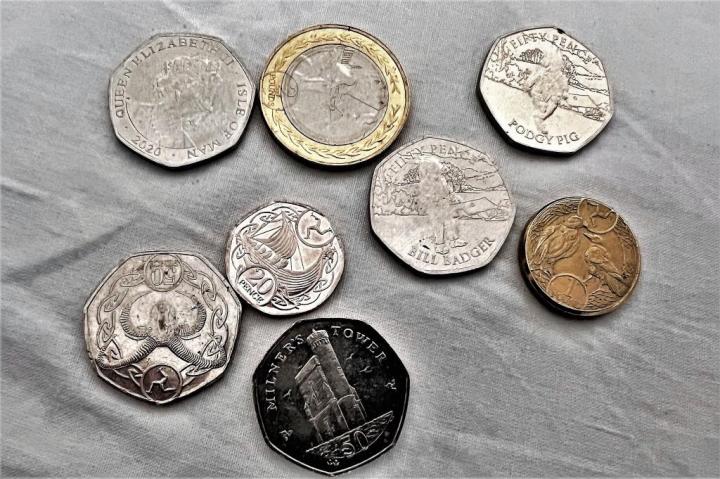(I can’t believe I’m referencing ABBA.) The United Kingdom, the Channel Islands, and the Isle of Man are all on the British Pound. English Coins and Bank of England notes are accepted all over. But each jurisdiction also issues its own banknotes, and they are NOT accepted in the other jurisdictions, unless they are. It is not predictable.
In Northern Ireland I had Guernsey, Jersey, Manx, English, Scottish and Northern Irish banknotes issued by two different Ulster banks in my wallet. I cannot spend the Guernsey, Jersey, or Manx banknotes in Northern Ireland. I got a Scottish banknote (It has a picture of two salmon) in change in Belfast when I bought a pizza, but I am not sure that I can spend it in Belfast. One of the Irish £10 notes features the Bushmills distillery.


When we were in the 2019 pre-pandemic UK we left with some Bank of England notes, expecting to be back in the pound zone in both 2020 and 2021. That didn’t happen. Now I find that those Bank of England notes are not spendable. The paper notes have been replaced by plastic banknotes. They last longer. I didn’t know this when I tipped a cab driver in Southampton with a paper note. He looked at me strangely but took it. Suzi had her paper notes rejected when she tried to buy something at the Southampton airport. We tried to find a bank that will change paper for plastic in Belfast (it sounds like a supermarket.) One bank directed us to another bank. That bank refused to change the money because we did not have a UK account to deposit the money in. They said money laundering laws prevented them from giving us plastic cash for paper cash. That bank told us to go to a post office. We didn’t get to a post office until we got to the causeway coast. The post office in Ballycastle was in a back corner of a gas station/convenience store. The person at the counter told me that she could take the paper bills and credit the amount to my UK bank account. Then she said, “I don’t suppose youse have one.”
“No, I live in Alaska.” Playing the Alaska card almost always works.
“Youse a long way from home, I’m not supposed to do this but…” She changed the money from paper to plastic.
In Jersey I bought some cokes and produced an English banknote. The shopkeeper was shocked. “No one’s spent real money here in ages. Since the pandemic it’s all touchless cards. Martha, do you know where the cash drawer key is?” I offered a credit card, but he said: “No, this is very nostalgic.” It took them a while, but they found the cashbox key and made change, which is why I have a Jersey banknote in my wallet. By the way, Jersey banknotes are in French on one side. “Une Livre” is not an English soap company.


In Denmark they hardly use money at all. Our friend, Torben, told me that if he goes to the ATM machine, he is limited to a Danish Kroner 1000 withdrawal (not quite $145). If he withdraws more than DKr 3000 (less than $435) a month in cash, he gets a call from the bank asking why he needs so much cash. We had DKr left over from our last visit to Denmark in 2019, before the pandemic. As we were getting in line to get into Tivoli Gardens, I noticed that everyone was either using a credit card or cell phone account. When I gave the lady in the booth cash she asked “What? Did you print this? This is so unusual. And they are so crisp.” Suzi asked one Danish woman how do Danish kids learn to handle money without cash or bills? She says kids are given a watch in which parents load the allowance, they can wave it at a censor to buy, say, a candy bar. A debit watch! I got some Danish coins in change for our admission to Tivoli, but most kids here apparently don’t have coins jingling in their pockets.


On the islands under the crown but not part of the UK, Jersey, Guernsey, and the Isle of Man, kids can jingle coins that the islands issue themselves. They are the same size and weight as British coins but are not accepted outside their jurisdictions. I wonder if they work in vending machines. The exception seems to be between Jersey and Guernsey, where the coins are, in practice, interchangeable. The Isle of Man is a leader in coinage. They have £5 coin in circulation while the UK does not. The Manx coins pictured on webpages often have cats on them, but I didn’t find any cat coins. I have a Manx £2 piece featuring the famous TT motorcycle races. I also have Manx coins with Viking ships and children’s storybook characters.

When we got to Germany, we were back to a cash economy. The waitresses have their big leather wallets for bills and coins to make change, but now they also have a card reader. The waitress (a refugee from Ukraine) said that in Ukraine they don’t use nearly as much cash as the Germans. “Ukraine is modern.”

Our final stop was Reykjavik, Iceland. We took the bus from the airport into town. At the bus terminal counter where you can book a van to your hotel there was a sign “we accept only touchless credit or debit cards. No Cash.” There was an ATM machine near the counter, but the agent said “don’t bother, no one takes cash, except on the city bus. You need exact change, 570 Islandic Kroner per ride. Most people install the app on their phone.” So, I didn’t get cash.

While everything in Iceland does seem to work on cards. I noticed that at restaurants, where you pay by card, there is a jar for tips near every register. It is usually filled with small coins. Tipping is not part of the Icelandic culture, but it was customary to leave loose change on the table after paying the bill. With credit and debit cards there is no loose change. The Website playiceland.is says “Iceland is an almost cashless society, (but) you might want to get a bit of cash… for tipping.” So, I made a trip to the ATM machine and took out the minimum amount. It comes out of the machine in one big bill. At the counter do I stuff in the big bill in the jar and take change? I bought a chocolate bar at a corner grocery store and got change as well.







Fascinating! I learn so much from your post. Hey, the song lyrics got me!